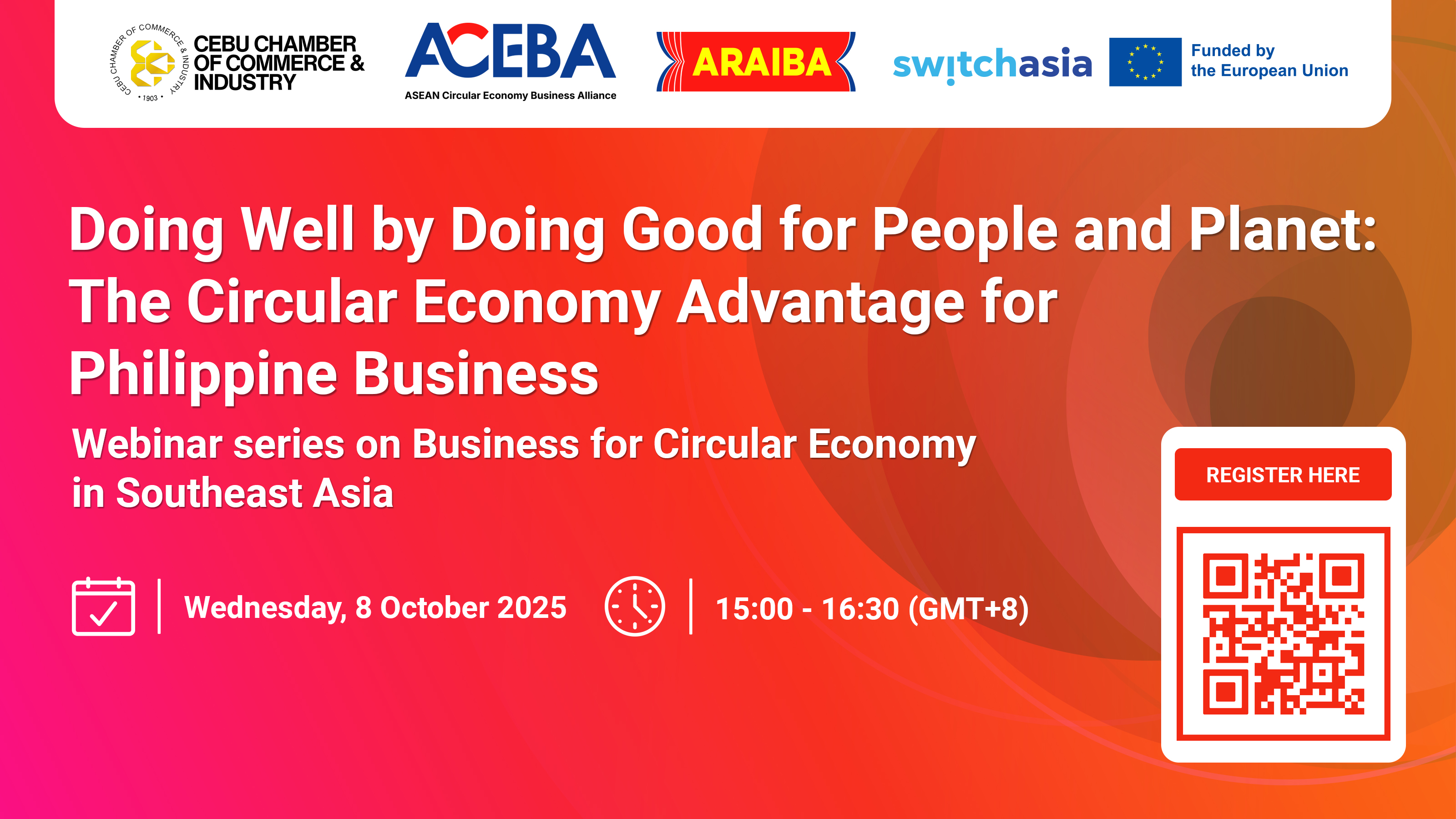Doing well by doing good through Circular Economy: ACEBA and CCCI furthers conversation with Philippine businesses

The ASEAN Circular Economy Business Alliance (ACEBA) and the Cebu Chamber of Commerce and Industry (CCCI) continue to engage local businesses and practitioners in the Circular Economy (CE) discussion via an online learning event held last October 8, entitled “Doing Well by Doing Good for People and Planet: The Circular Economy Advantage for Philippine Business”, the third in a series of webinars on Business and Circular Economy in the Philippines.
The country finds itself at the nexus of the triple planetary crises of climate change, pollution, and biodiversity loss--identified in the World Risk Index for 17 consecutive years as the most vulnerable country to extreme weather events, especially flooding[1]; projected to generate 7.4 tons of mismanaged waste in 2025, and ranked the 3rd largest contributor to plastic pollution globally[2]; severe biodiversity loss in the country accelerated by habitat destruction from logging, agriculture, development, and overexploitation of resources, with a recent study estimating up to 30% of land dwelling vertebrates at risk of extinction if current threats persist[3].
The business sector plays a critical role in addressing the degradation of ecosystems, deforestation, pollution, and waste associated with their activities or supply chains, and businesses are called to adopt sustainable and responsible practices, such as circular solutions, to reduce their environmental impact, and hasten the transition to green economy. A number of businesses in the Philippines in different sectors such as hospitality, building materials, agri-food, textiles, and recycling and resource recovery are already innovating and involving value chain stakeholders in circular business modeling and related activities[4]. But more businesses need to be involved to mainstream CE, and maximize gains and impacts.
Thomas Thomas, ACEBA co-convenor and ARAIBA Sdn Bhd chairman, set the tone of the conversation from the start: “Regardless of the setbacks, regardless of what happens, we have to go on. That are real valuable lessons in resilience or the spirit of the community coming together, and working together to solve problems. Just over a week ago, on the 30th of September, an 6.9 magnitude earthquake struck Northern Cebu; damage is reported to be about PhP3 billion (about USD61 million). The first reaction when we heard about this earthquake was to postpone this webinar, to give time for the response efforts of the CCCI, and time for the people of Cebu to recover. But the response from the Chamber was ‘Let’s proceed as planned.’ This was a valuable lesson in resilience that we can all learn from, and through this webinar, show that in practical terms, circular economy is doable. We need to not only do well and do good, but we also have to do it together to make it work.”
CCCI president, Jay Yuvallos, in his opening remarks, added, “I would like to highlight two words: one is IMPACT, and the other is INFLUENCE. Impact means ‘to press closely, to fix firmly, and to drive into’. This is what we need—to embed circular economy and circular models in business thinking and actions to reverse negative business impacts, and to influence our tomorrow by the choices we make today. Fix our current problems to move forward in competitiveness as well as in sustainability.”
Understanding circular business is key to moving forward and unlocking its benefits. Dr. Rene Van Berkel, ACEBA co-convenor emphasized in his presentation, “There is no pause button in the planetary and societal challenges we are dealing with. Transitioning to CE means doing everything we can do to avoid waste and emissions, getting everyone else to do the same, and make sure this becomes a movement. There is initial understanding and general perception that an economy that ‘takes, makes, uses, and recovers materials’ is what is circular. But in many cases, we see that a circular economy is just positioned as the opposite of a linear economy, which leaves quite a lot of room for varying interpretations and a degree of misunderstanding, disinterest, and skepticism. A circular economy is not just a recycling economy, it goes beyond that. Circular economy is a systems perspective that deals with the inflows of natural resources into the economy, and the outflow of resources from the economy and society as waste into the environment. Majority of the negative impacts created by the current linear model is due to using too much materials and resources. The aspiration of circular economy is to bring both net inflows of resources and net outflows of resources as close as possible to zero; this basically then opens an innovation space for ‘decoupling’--ultimately, we want this circular value chain, where everything is recovered and goes back into product manufacturing, and we just add materials to allow for some growth. So we start to de-risk the economy and society from the impacts of unsustainable extraction and use of materials”.
ACEBA’s framework for business action for Circular Economy is anchored on the abovementioned principles and targets—net zero impact on climate, nature and the environment; resource circularity, efficiency, and substitution; responsible business practice; co-creation of circular solutions and innovations with value chain stakeholders; and net socioeconomic impact.
As documented by ACEBA across ASEAN, several business cases like Renewcell in Malaysia, Advanced Prefab in Thailand, and Pico Sands Hotel in the Philippines are delivering value on three fronts: improving efficiency and profitability; reducing waste, emissions, and resource use; and generating jobs, supporting communities, and sustaining well-being. There are also businesses like Husk Ventures in Cambodia, Ock Pop Tock in Lao PDR, and Reztyle in the Philippines that show the sociocultural dimension of circularity—opening new markets for community-based artisans and traditional crafts while protecting heritage, creating decent jobs, and reducing environmental impact.
Micro, small, and medium enterprises (MSMEs) in the Philippines are demonstrating their circular business model’s profitability and social impacts. Olive Puentespina, president and CEO of Davao Thermo Biotech Corp., shared how the company was able to divert over 40 million kilos of biodegradable waste from landfills in Davao City through its large-scale aerobic composting facility, which processes and transforms up to 30 tons of biowaste daily into nutrient-rich compost. This compost, which is sold to local farms and farmers, help restore soil fertility, reduce chemical use in farming, and improve yields. The company is seeking to deploy their technology and expand operations to other provinces. Another agri-enterprise, Axel Integrated Farm in Samar, helped coconut farmers turn coconut sap into coconut syrup, an affordable and sustainably produced alternative to honey. The farm also recycles organic waste, and plants native trees beneath coconut palms to restore soil health and moisture. This model of low-carbon farming and syrup production now provides coconut farmers with stable, higher incomes, which according to Axel’s farm manager, Jayson Pascual, is now up to PhP25,000 per month. Precious Plastics Philippines in Antipolo City uses open-source, locally made shredders and extrusion machines to transform 2,000 kilos of flexible plastic waste per month into plastic lumber and furniture. Butte Metz, its founder, said the company is developing a ‘product passport’ tracking system to improve recycling transparency and traceability, and will be setting up a large recycling plant in Antipolo to scale up operations, with multiple hubs nationwide by 2026.
A number of current challenges for MSMEs were raised during the discussion: access to market and product distribution channels, generally low awareness and uptake of sustainability practices among local communities and the public, and fragmented waste management systems. ACEBA, through its CE learning events and knowledge-sharing platforms, is committed to continue working with local champions to increase visibility of their CE efforts and examples, and inspire other enterprises to reimagine their business models, and design circularity into their operations, products, and services. Upcoming sessions will discuss more practical steps and build the necessary competencies and skills in firms to become more circular.
[1]2025. Relief Web. World Risk Report 2025. https://reliefweb.int/report/world/worldriskreport-2025-focus-floods
[2]2024. Fuentes, Harold, et.al. A comprehensive assessment of plastic pollution inland, on riverbanks, along the coastline and at the sea surface in Southern Mindanao, Philippines. https://www.sciencedirect.com/science/article/abs/pii/S0025326X24011111
[3]2025. Flores, Dominique, The Philippine Star. Up to 30% of land vertebrates in Philippines may vanish, scientists warn. https://www.philstar.com/headlines/climate-and-environment/2025/10/08/2478217/30-land-vertebrates-philippines-may-vanish-scientists-warn
[4] ACEBA Business Cases: Philippines. https://www.aceba.co/aceba/business-case/?country_list=philippines
Share:
